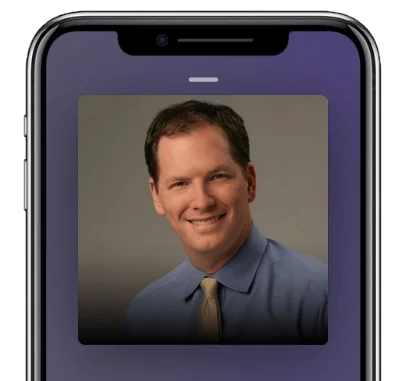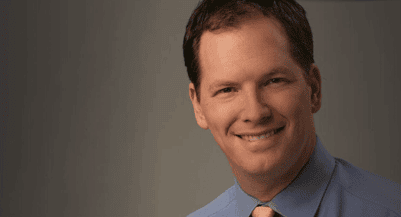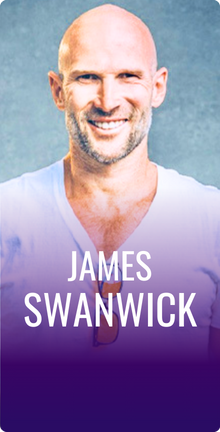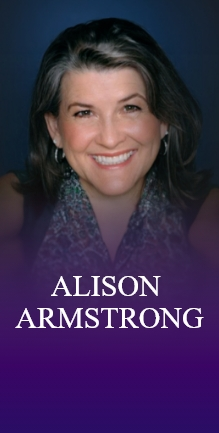In this Episode
- [2:37]Dr. Breus talks about chronotypes and why he developed an assessment tool to classify people into four categories.
- [7:03]Your chronotype category indicates how your hormones will function throughout the day.
- [9:22]Dr. Breus talks about the how chronotypes can and can’t change.
- [11:41]The challenges of being in a relationship with a different chronotype, in regards to schedule.
- [15:36]Dr. Breus talks about the PER3 Gene and how it impacts your sleep drive.
- [16:36]Dr. Breus explains sleep drive and circadian rhythm.
- [18:50]The 8-hour sleep need is a myth and how to determine your personal sleep need.
- [21:39]Dr. Breus breaks down the sleep cycles.
- [23:44]Why our circadian rhythm causes us to hate Monday mornings.
- [25:48]Dr. Breus talks about sleep monitoring.
- [29:19]The science behind “no screens in bed”, except televisions. This leads to a discussion on blue light.
- [36:23]Dr. Breus talks about sleep while traveling and he shares what is in his sleep kit.
- [37:05]Dr. Breus addresses the issues of melatonin supplements.
- [38:39]Dr. Breus shares his thoughts on caffeine and explains why you shouldn’t drink coffee right after you wake up.
- [42:11]You are more likely to sustain an injury if you exercise in the morning, before your body’s core temperature has had a chance to rise.
- [44:38]Dr. Breus explains narcolepsy, insomnia, and the inability to turn off your brain.
- [49:48]Dr. Breus shares some breathing exercises for sleep.
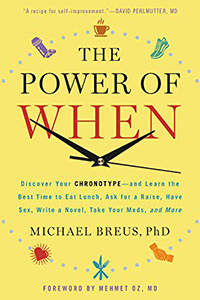
It’s great to have you, Michael. We’re going to have a really great and interesting discussion about your new book and sleep, in general. Welcome to the show.
Thanks, I’m excited.
The Power of When, your new book, the premise is that people have a chronotype and you need to understand what your chronotype is in order to figure out what your schedule should be, when you should wake up, how much sleep you should get, when you should have sex, when you should eat, when you should take your meds and everything in between. Let’s just start there. If you could describe what this means, a chronotype, and how important this is to people’s health.
It’s kind of fascinating. As a sleep specialist, I have people coming in all the time and we’re always talking about their different sleep issues whether it’s apnea, narcolepsy, or insomnia. Insomnia tends to be my specialty with my background in clinical psychology because we know there is a good bit of psychology that can go into a person who’s got some issues with insomnia. I was treating patients. I have been for the last 15, 16 years and then all of a sudden some of my methodologies weren’t working as well. The treatment protocols weren’t working as well with a very small group of people and I didn’t understand it so I started to interview them and it turned out that they said to me, “Dr. Breus, it’s not that I have a hard time falling asleep or have a hard time staying asleep. Once I’m asleep, I sleep great and I sleep for six and a half, seven and a half, eight hours. I’m just doing it at the wrong time.”
I had known about people who were off because they were shift workers or police officers or military or firemen or what have you, but I hadn’t come across a whole lot of people who just didn’t sleep at the right time. I started to look into the research to try to discover, “Okay, what can I do with these people?” It turned out that there were these ideas called chronotypes. Chronotypes are actually nothing new and actually people out there have known about them for quite a while, almost everybody listening has probably heard of either an early bird or a night owl; those people who have a tendency to get up super early, start their day at [5:30], end their day around [8:30] and then there are the night owls. Anybody out there who has a teenager knows what that is. I have two teenagers and they are both night owls because that’s just part of their biology during the teenage years. The biological clock has a tendency to shift late so you see teenagers staying up pretty late.
People are kind of aware of those but it turns out that there are actually several other chronotypes that hadn’t been well documented in the literature. I found some pretty interesting studies to help me work through those. They are the people who are in between and then there are the problem sleepers. I didn’t like the bird vernacular that was going on around them. I’m a mammal and I wanted to identify with the mammals so I was able to develop an assessment tool. It’s a quiz that people can take at thepowerofwhenquiz.com. It’s for free and you can go there and then you can get put into one of four categories. The early bird gets replaced by what I’m calling a lion and we also added personality traits to these archetypes because the literature actually showed some very interesting aspects to them.
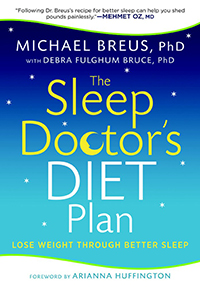
My lions are often times my leaders. These are the people that are oftentimes the COO of a company. These are the people who are early to bed, early to rise. They are my kind of get it done folks but it’s interesting because they do have issues being super creative. They have a much greater likelihood of taking a course of action to go from a to b to c to d and they don’t like to deviate very much. My bears, which are my in-between people, actually make up the fabric of society, roughly 50%, 55% of people out there are bears and they follow kind of a solar schedule. These are the fun people to hang out with. These are the people that you enjoy spending your social time with. These are very social people but also they get a lot of work done as well. These are the folks that are kind of the glue for society, if you will. A lot of your friends out there you’ll find are bears.
Again, roughly 55% of the population are. My night owls are more like wolves. I chose wolves because wolves are actually very nocturnal creatures. They hunt at night and that’s when they do their thing but my wolves are very interesting. My wolves are more introspective, they’re my creatives. My artists and my authors and my actors are a lot of times night owls. They actually perform better at all of their tasks and activities in the late, late evening but once you get to know them they become much more gregarious and much more kind of the life of the party. Then are my dolphins, my dolphins are my patients. These are kind of my type-A personalities. They are very intelligent but one of the things that seem to hold them back is their obsession for perfection. These are the folks that have a tendency to want to get every single detail, just down to the nubs, and be able to identify it. Sometimes they can’t get out of their own way in order to complete a task because they’ve gotten so bogged down in the details.
Once you figure out what your chronotype is, then I actually have a very close understanding of how your hormones are going to function during any given time during the day. If you’re a lion and you’re getting up early, I know your hormone distribution actually is significantly earlier than if you are a wolf getting up later in the day. Then, what I decided to do was I said what would happen if I mapped these chronotypes versus daily activities, could I find perfect times of day for each chronotype to do different things. It turned out that it was actually much easier than I had expected. Through a literature search, actually several literature searches through multinational journals, what we discovered was there were actually over 350 studies out there. We used about 200 in the book because quite frankly the book was just getting so big and we chose 50 different activities for people to look at.
I categorize them under things like relationships, when to get into a difficult discussion with your partner or when to have sex or when to fall in love. On the work side of things, it was things like when should you ask your boss for a raise, when should you go on a job interview, when should you email or cold call. The list goes on and on. I’ve got sections in there on sleep, on activities, when should you be doing yoga versus a strength sport versus a team sport versus a cardio sport. It was interesting because the more people that take the quiz, they tell me that, “Wow, you really figured out a lot of who I am. I do find that there are certain times of day where I just do things better. I never realized it until you helped me identify it.” It’s been a lot of fun. It’s been super interesting to see how people are reacting to the ideas of a chronotype and rescheduling their world. Most self-help books tell you what to do or they tell you how to do it but they don’t tell you when to do it. My book is called The Power of When because it helps you not change what you’re doing, just change the timing.
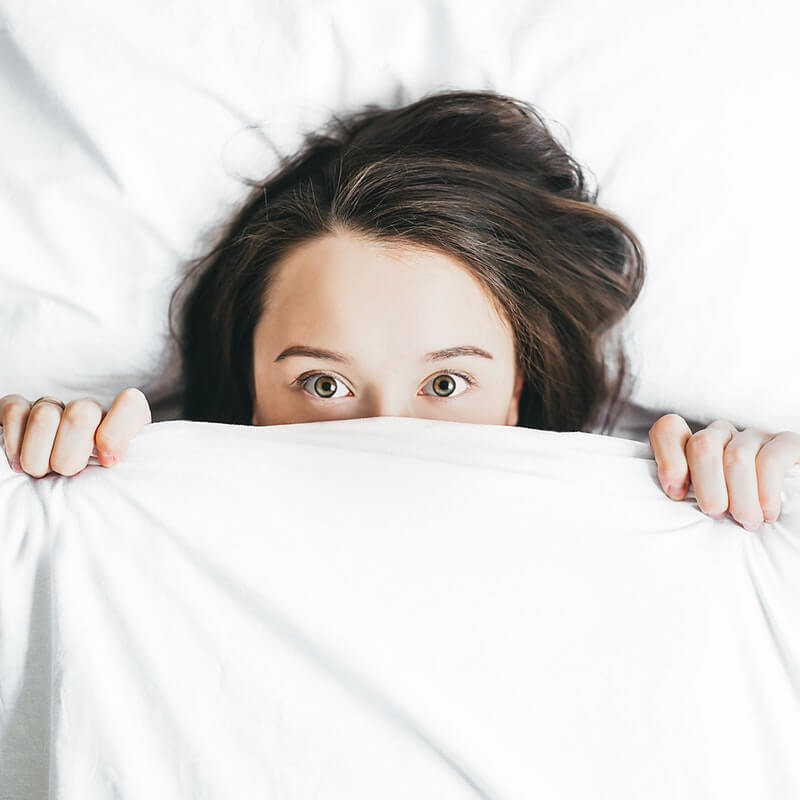
Don’t people change their chronotypes or is that something that you’re stuck with? I’ve been reading a book and what you’re saying is there are different times in their life that they’ll be a particular chronotype. I just wanted to see if I’m a wolf, can I make myself more like a bear or am I stuck as a wolf?
It’s interesting. We know that different ages have a greater tendency to have different chronotypes until kids reach about the age of 17, 18, and then it does have a tendency to be more set. Then from there, we know that as people hit the 55-60 age range that your chronotype has a tendency to change. Usually, during between the ages of 20 and 50, 55, your chronotype is something that’s pretty well genetically set. Now that being said, you can fudge it a little. You can move it around a little bit. As an example, if you’re a wolf but you got to get up at [6:00]AM, I can show you ways. We talk about ways in the book to maybe help bend that a little. You’re never going to become a lion if you’re a wolf unless you’re about 65 years old and your body face advances and you’re all about the [5:00] dinner and the blue-plate special, which does happen by the way quite frequently. We think that has to do with the decrease in melatonin production as the body ages.
What if you’re with a person who’s kind of the opposite chronotype? I think I’m a wolf. I took the quiz and I scored a 43 which is close to being a wolf but not quite. I think 46 or something was like the cut-off.
Exactly. You’re a bear with wolfish tendencies or a wolf with bearish tendency.
My mother was a wolf. She worked third shifts her whole life. Even when she didn’t work, she was in a nursing home, she would have a hard time staying awake during the day and she’d be awake at night. The frustration of her caregiver is there. That was in the later part of her life so she never kind of really switched off of being a wolf. I was very much a wolf through my childhood and into my adulthood. I would stay up all night, sleep during the day and stuff.
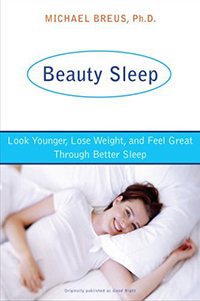
One of the easiest ways to try to figure out your chronotype if you have a question is to look at your parents. That is usually because that’s where most of your genetics is wandering in from. You will actually find yourself leaning more towards the characteristics of one if not both parents. You bring up an excellent point which is what happens if you’re a couple and one person is a lion and the other person is a wolf. When do you have sex? When do you go out to dinner? How do you decide to plan a big event? Things like that.
When do you even just go to bed because I want to go to bed at the same time as my fiancé and so does she but she is more of a lion or bear. We haven’t quite figured that one out either. I think she’s more lion than bear. I’m more wolf I think than bear so we’re almost like the opposite ends of the spectrum but we want to go to bed at the same time. How do you do that?
It’s okay to go to bed at the same time but you’re probably not going to fall asleep. I have a lot of couples who actually do that where one member is on the lion side of things. What ends up happening is they get in bed together right around maybe a little later that a lion might like to be getting into bed, then the lion usually falls asleep fairly quickly and then the bear or the wolf just uses a book light and will read or watch TV wearing headphones so it doesn’t bother them, their bed partner. You start to adapt through that. The big problem is early in the morning when the lion has an alarm that goes off at [5:30] because they want to get up and the wolf can barely function at that time. A lot of times, believe it or not, I ask them to have a pillow speaker for their alarm. You can find them at RadioShack. You can actually attach it to your alarm. You can even attach it to your telephone if you’re using that as an alarm to help wake them up with a small vibration or a small sound that actually goes through the pillow and doesn’t wake up the bed partner.
You can wear a Fitbit or something that would vibrate to wake you up.
Absolutely. You work through it but what’s the important aspect is once you’ve identified the different chronotypes, then everything gets a lot easier because then it all of a sudden starts to make sense because prior to that I have couples who are like, “Why won’t you just come to bed?” The other person saying, “Because I’m not tired and I don’t want to just lie in bed. It drives me crazy. That’s my time to be creative.” They get into these discussions. It’s difficult. There’s nothing simple about making your way through all of that. It’s very interesting to see how it goes but once the education comes in and people get it, things get a lot easier.
You suggested taking the quiz which you don’t have to buy the book. You just go to the website thepowerofwhen.com. There is a mini-quiz that you also offer people who weren’t quite sure. I took that and I was a wolf according to that, I got a minus two on that.
I would go for your wolfish tendencies there and I would say that you’re a wolf.
We have a lot of discussions about why aren’t you coming to bed, come on let’s go to bed. This is ridiculous and it’s [1:00]AM. Finally, I’m acquiescing and we’re going to bed. That does not lead to a lot of harmony so we definitely have to address it.
It’s interesting. I have a unique situation in my house where I’m a wolf but I don’t require a tremendous amount of sleep because my PER3 gene is actually short or at least we think it is, we haven’t actually gotten it tested. I only need about six and a half hours of sleep so I get in bed at midnight and I get up at [6:30]AM. My wife needs more sleep, she has a lower disc problem so she finds it more comfortable to be lying in bed. She might get in bed at [9:30]PM, [10:00]PM and she won’t fall asleep until [11:30]PM, [12:00]AM. I’m wandering in around [12:00]AM, [12:30]AM and then I’m up at [6:30]AM. I’m wondering why isn’t everybody up.
You mentioned that gene, the PER3 gene. There’s short PER3 and there’s long. It varies in lengths and the longer, the more sleep you need.
That’s correct. That has a lot to do with sleep drive. There is actually a study that just came out last week that looked at the PER2 gene as well. It wasn’t a particularly conclusive study but what we’re now starting to see is a lot of the research is starting to focus in on the genetics of all of this and trying to understand this better and really trying to get themselves and get everybody well educated on this stuff and then looking at it from a research perspective. It’s super cool and it’s a lot of fun.
How do you find out the length of your PER3 gene?
I don’t know if [00:17:15] would do it. You probably have to do some pretty specific genetic testing but again the quiz really gets you past that point. You certainly don’t have to do that.
Got it. You mentioned something that you call sleep drive, you equate it to sex drive. Let’s talk a bit more about sleep drive and what it means.
It’s pretty amazing when you start to look at the rhythms of the body and see how they can affect your overall levels of productivity during the day.
What’s interesting about sleep drive is that when you look at sleep in general, there are two distinct systems in the brain. One is a drive much like hunger. I’m hungry, I’m hungry, I’m hungry. I eat something and that hunger dissipates and goes away. We know that this at least in part is a buildup of a substance called adenosine. Adenosine is a molecular byproduct, once the cell has used up some glucose and energy, there is something that kind of comes out the back end. Part of that is adenosine and as that builds in the system you have adenosine receptors in your brain. As those fill up, you get sleepier and sleepier and sleepier. The amount of adenosine required is going to be different from each individual but that has a lot to do with your sleep drive. Oddly enough, if you look at the molecular structure of adenosine and you look at the molecular structure of caffeine, they’re off by one molecule. We think that the caffeine substance actually fits quite nicely into the adenosine receptor and that blocks the adenosine from activating and causing that level of sleepiness which is one of the reasons why coffee makes you not sleepy anymore. We know that the drive seems to occur based on this buildup of adenosine. The second area or system within sleep is called your circadian rhythm and that’s what the book is primarily about. It’s looking at these different circadian rhythms within the body because each one of your organs has a different circadian rhythm. Your brain does. Your sleep does. It’s pretty amazing when you start to look at the rhythms of the body and see how they can affect your overall levels of productivity during the day.
Everybody needs a different amount of sleep depending on their sleep drive, on their PER3 gene, their chronotype, etc. Let’s say that you’ve been getting four hours of sleep at night for a very long time.
Oh, dear.
Now that’s not me thankfully but I know some people, it’s like they wear it like a badge of honor.
I know. It’s crazy.
It is crazy and it’s killing them but they’re like in this denial about it. What are the implications here if you are chronically sleep-deprived? You’re just a machine basically. There will be enough time for me to sleep when I’m dead, that kind of mentality.
First of all, eight hours is a myth. Eight hours came from a study back in the 40s. We now know that people have evolved in different ways. Everybody has a different sleep need which is unique to them. I’ve been a six-and-a-half-hour sleeper literally almost my entire life, my wife needs eight and a half. That’s just a big difference between the two of us and so we schedule and work our way around something like that. What’s nice about it is you can actually determine how much sleep you need quite easily. The average sleep cycle is approximately 90 minutes long. The average individual has 5 of those so 5 times 90 is 450 divided by 60 gives us 7 and a half hours of sleep.
What I have my patients do is based on their socially determined wake up time, if they have to wake up for work or school or kids ready or things like that, count backward seven and a half hours and then get in bed then. If you can wake up consistently within five minutes before your alarm goes off, then you figured out your bedtime and you figured out your sleep need. If you end up waking up an hour before your alarm, then guess what you can go to bed an hour later or if after a week or so you still need the alarm, maybe you need to go to bed half an hour earlier. If you run this experiment, you will be pleasantly surprised that you’ll discover what your sleep need is then you’re winning half the battle because as soon as you know what your sleep need is and you know your chronotype, you can nail it and feel great.
Isn’t it more than just the amount of sleep, it’s the quality of the sleep?
It is.
What wave pattern you’re in for a different time. I have heard that you need an hour of deep sleep for somebody who’s in their 40s. A man like myself would need an hour of deep sleep at night. I don’t normally get that. Maybe I’ll get 45 minutes, I’ll get 55 minutes on a good night. I know this because I’m using a Zeo to track my sleep which we can talk about in a minute. If I’m getting let’s just say an hour of deep sleep, is all the other stuff not nearly as important, the REM and the light sleep, it’s nice to have but deep sleep is the key thing or is all of it important?
The easiest way to improve the quality of the sleep is the consistency of your nightly schedule.
It’s interesting. Sleep is a very peculiar thing. First of all, the easiest way to improve the quality of the sleep that you’re getting, and that’s really what we’re talking about when we’re talking the different stages is really the quality of that sleep, is the consistency of your nightly schedule. Going to bed at the same time and waking up at the same time, even on the weekends. That’s hard for people, especially the weekend thing. People say, “Oh, I got to catch up on my sleep.” What I try to explain to people is sleep is a lot like a baseball game. If the game is supposed to start at [8:00] and you show up at [9:30], that doesn’t mean that the game restarts. You show up and you missed the first three innings. What’s interesting is that the first third of the night is when you get the largest amount of deep sleep.
Deep sleep stands for stages three and four sleep. This is the physically restorative sleep. We know that this is where large amounts of growth hormones are emitted. We know this is where you bring your car into the body shop. You got a lot of tissue repair, a lot of cellular regeneration. All of those things are occurring during stage three and four of sleep. That happens in the first third. If you go to bed an hour or two later than what your chronotype wants you to do, you’re not going to get that. You’re going to get light, crappy sleep, stage one and stage two sleep. On the opposite of the spectrum is REM sleep. REM sleep, while it does happen in each cycle, it gets more and more in terms of amount in the last third of the night. We know that REM is really your mentally restorative sleep. It’s when you’re moving information from your short term memory to your long term memory or when you’re taking stimuli and you’re putting it into an organizational structure in your brain for retrieval, to be able to solve problems, things of that nature.
Consolidation.
Yeah, exactly. One of the things that’s critical here is consistency. If you’re going to bed at the same time and waking up at the same time, roughly within about 20 or 30 minutes on either end, you will find not only will the quality of your sleep improve but in some cases you might not need as much. I’ve had many patients turn to me and say, “I can’t get my eight hours.” My first question is like, “Who told you you had to get eight hours?” They say, “Well, that’s what it says in all the books that I read.” To be honest with you, the data is really not consistent on that. The data is however super consistent on you getting a consistent schedule. The more consistent your schedule is, the easier it is to get to a good quality rest. As I said before in many cases, you may not need as much as you think.
When you don’t get the consistent sleep, you’re sleeping in on the weekends, especially Sundays. You get the thing Sunday night insomnia or something.
Exactly. If you stay up late Friday and sleep in on Saturday and stay up late on Saturday and sleep it on Sunday, it literally only takes two days of oversleeping for your entire circadian rhythm to shift. You got Sunday night insomnia where your body wants to stay up late on Sunday and sleep in on Mondays. This is one of the reasons why everybody seems to hate Monday morning.
That really messes up your whole week. It’s not just the next day or two where you’re suffering. It’s the whole rest of the workweek.
Usually, by about Thursday, your body has finally adjusted back and then you’re right there on the weekend. Especially if you’re young and you’re out and you’re socializing quite a bit, not that older people don’t socialize, everybody socializes, but if you’re out a lot, what you’ll discover is that you’ll get onto this weird cycle where you’re not feeling so great on Monday or Tuesday, Wednesday. Finally, Thursday you start to feel good. Friday you feel great and you’re ready to go out and then come Sunday night the whole process happens again. It’s really about consistency.
Let’s say that somebody wants to track their sleep, the quality, and the amount of it. The Zeo is what I use but they went out of business so you’ll have a hard time finding one nowadays.
I know. It’s unfortunate, it was a great device.
Yeah. I think you were an adviser to them or something.
I was.
That was a great company. I slap this headband on. I look like a total geek and my fiancé still loves me.
There you go, you found the right girl.
Melatonin is the key that starts the engine for sleep.
Yeah. That’s right. I don’t believe in these apps, you set them on the bed, and then it tries to figure out how much deep sleep you got based on whether you’re moving around and vibrating the bed or whatever. I can’t imagine that being very accurate. Whereas the Zeo is monitoring my brainwaves. Do you have any alternatives that you recommend or do people need just a rough guess of how much total sleep they’re getting and it doesn’t really matter whether it’s deep sleep or REM or whatever?
Sure. When you look at sleep monitoring which is a very, very big topic these days, I’m actually going to be giving several lectures on sleep monitoring. The national sleep foundation is sponsoring a whole day at Health 2.0 where we look at what are the latest advances in sleep-related technologies. We’re doing a whole subsection just on sleep monitoring. The Zeo was cool because it’s a headband that you wear. It’s full-spectrum EEG and that’s one of the ways that we measure sleep or at least the sleep stages. When you look at the apps that are out there, I swear I can’t count the number of times that somebody comes up to me and says, “Dr. Breus, can you tell me what my sleep cycle means?” No, I probably can’t because it’s really all based on accelerometry. If you’re moving, then you must not be asleep and if you’re not moving then you must be asleep. That’s the premise behind a lot of these apps.
The further away you get from the body, the more difficult it is to have a level of accuracy. If you’re looking at something like a Jawbone UP or an Oura ring or other types of devices that are actually on your body, look at what their measuring, there’s now a good algorithmic data to show that heart rate variability is different in different stages of sleep. In some cases, just wearing something that has a heart rate monitor on it, they’re now starting to adapt these signals and getting much more accurate than the iPhone under the pillow methodology that we’ve seen in so many people or so many apps rather. There’s also now devices that you can actually put under the sheet or under the mattress. There’s something called Beddit which I like a lot. There’s something called the Aura Withings. That’s actually been shown to be pretty accurate.
We’re starting to see some evolution, if you will, in the monitoring space which is starting to get us closer and closer. The companies are also doing something called cardio balistography. When your heart beats, it sends out a signal, the same way if you threw a stone into a pond it sends out ripple. If you have a monitor that’s on your body or beneath your body that can measure that ripple, then that becomes algorithmically we can actually to stages one, two, three, four, and REM much easier than we normally could have. The algorithms are becoming far more sophisticated. Unfortunately, the Zeo is gone. If you’re starting to look for sleep monitoring, some of these other devices I’ve been talking about can be really good. My favorite one actually is something called the S+. This is a device that I’ve got next to my bed and it actually sends out a radar signal. It can measure chest compression to the millimeter. It actually looks at breathing patterns, heart rate, and actually does a nice, nice, accurate job of identifying my sleep stages for me.
That’s so cool. I’ll have to check that out. There is also a device I’m going to try out called the NeuroOn. Have you heard of this?
I have not heard of this. Tell me, tell me.
They had a successful Kickstarter campaign. They got funded, and that’s like a $300 device. It’s a mask that you wear and it has the ability to do binaural beat stuff as well. I don’t know exactly. It’s on its way. When I get it in the next day or two, I’ll have to try it out and let you know. Looks promising.
I see you on Saturday sometimes. You’ll have to let me know how it’s going.
Yeah. Yeah. That’s an interesting one. Speaking of technology, you have a pretty firm stance about no screens in bed after certain period of time, once you’re getting close to bedtime. What’s the science behind that because I know that there’s melatonin response from the blue light?
Absolutely. We’ve now got probably 10 to 15 studies that have indicated that 416 nanometers or the blue spectrum of light has a very large effect on an [00:31:53] called the suprachiasmatic nucleus which is the center of the biological clock. What’s fascinating is about seven years ago, there was a discovery that there are certain cells in the eye called melanopsin cells. These cells are hypersensitive to this particular frequency of blue light. If the blue light hits the melanopsin cells, it basically sends a signal to the brain to stop producing melatonin. That becomes kind of a problem because if your brain stops producing melatonin, while it’s not the only thing that you need for a good night’s rest, it is the key that starts the engine for sleep.
Melatonin is called the vampire hormone because it has a tendency to only come out in the darkness.
One of the things that I do for people is we try to do an evaluation of the light that’s in their room in the evenings because what you don’t want is your brain to think it’s morning when you get into bed at night and try to fall asleep without any melatonin. That’s quite difficult. We call melatonin the vampire hormone because it has a tendency to only come out in the darkness. My recommendations are a little bit odd. They’re different than many of the recommendations that people hear out there. I ask for people to do what I call an electronic curfew where any of the phones or tablets or laptops that you might be using, you stop that approximately one hour before bed. But if you notice one of the devices that I didn’t mention is television. What’s really fascinating is when you look at the two other factors that a lot of people aren’t talking about which is proximity and engagement, it starts to make a lot more sense. When you think about a television, it’s usually 10, 12, 18 feet across a room and so the blue light that is coming at you begins to dissipate once it hits that kind of distance. It’s not nearly as effective in terms of keeping you awake, number one.
Number two, most of my patients that watch television at night, they don’t actually watch TV, they listen to the television. A lot of times they are already tired, they close their eyes, they may even turn the brightness level down on the television but it distracts their brain long enough to allow them to fall asleep. I’m the only sleep doctor in the universe that says it’s okay to fall asleep with the television on but what it’s not okay to do is to be checking Facebook right before you go to sleep and here is why. When you look at your device, first of all, it’s about 18 inches from your eyeballs so that’s an inherent problem from a proximity standpoint but it’s also very engaging. If you’re just listening to the television, there’s a very big difference between that cognitive engagement level of listening to a TV and replying on Facebook or sending out a tweet or doing an email or for that matter playing candy crush or watching Game of Thrones or whatever your pleasure might be. I’m oftentimes talking to people in a very specific way about the electronics right before bed.
What’s really fascinating is when you look at the two other factors that a lot of people aren’t talking about which is proximity and engagement. Share on XWhat about the lightbulb? It’s like everybody now has a compact fluorescent bulb. That’s probably not a good thing.
It’s not, not even close. I actually work very closely with a company lighting science group I believe their website is lighting.science. If you look, they now have commercially available lightbulbs that are super interesting and they’ve been able to filter out the blue light from the bulb itself and it’s imperceptible. It used to be when we looked at these lightbulbs that didn’t have blue light, they had an amber glow to them. It almost felt like you’re walking into an opium den. It’s just kind of like this is weird, funky. I’m not kind of grooving on this too much. I want to have regular light so I can read or what have you. They have a lightbulb that specifically filters out the 416-nanometer wavelength. I’ve got that those in my bedside table lamp. When I want to read, I’m not worried that it’s going to be affecting my ability to fall asleep at night.
How much are those bulbs?
I don’t know, that’s a good question. We can look on the website. They’re not cheap but you don’t have to replace them very often. It’s been pretty cool. They also have an awake and alert bulb and that’s great for those wolves out there who have a hard time waking up in the morning and can’t quite make it outside because let’s say you live in Minnesota and it’s too cold out. I actually have those awake and alert bulbs in my bathroom. I have the good night’s sleep bulbs in my bedside table lamp.
Alright but then what do you do if you have to go to the bathroom in the middle of the night?
I knew you were going to ask about going to the bathroom in the middle of the night. This company lighting science makes a night light that actually has the specialty bulb in it so you’re not worried about getting that bright blue light from a night light. I can go in, do what I need to do, come back and go back to sleep.
Nice. Okay, I’m going to have to get some new light bulbs I think. And then there’s also the iPhone has a brand new feature.
Yes, good point. Night shift.
I’m excited about that because I bought one of those screen protectors that blocks the blue light and I never put it on because I don’t want to have an amber glow to my screen 24/7. I never put it on. It’s still sitting in the drawer. I could not throw it out. Now, nightshift takes care of the problem but then there’s also the Flux app.
For computers.
If you have a laptop and you want to work in bed or you want to work late in the evening. You don’t want to get exposed to that blue light, that’s another great tool and it’s free.
It’s free. I know. That’s what I was going to say. I love it. I have it on my computer and I updated and it’s been wonderful.
Sometimes when I reboot the computer and then it goes straight to the blue light and it’s really shocking if it’s late in the evening. It’s like you just shot a big…
Like you went into a tanning booth.
Light is the biggest thing that affects melatonin.
Exactly. Any other tools that you would recommend for people to protect their melatonin in the evening?
Light is the biggest thing that affects melatonin. There’s no data to suggest that there is any diet or anything like that that has an effect on melatonin so it’s really about light. If you do have a bedroom that is more well-lit or you’re trying to sleep, let’s say you’re a lion trying to go to sleep while your wolf bed partner is up and it’s bothering you. I always recommend nightshades or a sleep mask. I’ve got a couple of them and by the way spend $20, $25 on a good one. There’s a great website. I don’t have anything to do with them. It’s called Dream Essentials. That’s where I get mine. They’re about $25, $30 but these are washable, reusable. I’ve had mine for like a year, a year and a half and they contour for your face. They do a great job of blocking out the light and it actually works out quite nicely.
Very nice. What about if you’re traveling? What sort of equipment do you recommend to travel with? Like the neck pillow or is there a special kind of pillow. I’m seeing some Kickstarter campaign of some crazy pillows that makes a hammock for your face and stuff.
I’ve seen that one too.
The mask and you could take pills for getting onto the new sleep schedule. What do you recommend with all that stuff?
When I travel, I actually create a little sleep kit depending upon the length of travel. If I need to sleep on an airplane, then I’ve got my eyeshades, my earplugs, and especially if I’m traveling significant distances then I may even use melatonin as a supplement to help me have melatonin when my body might not have normally wanted to have it. Jet lag is the situation where your brain is in one space and your body is in another. It’s all based on melatonin production. One of the great things that melatonin can be used for, quite effectively by the way, is scenario of jet lag. There’s a couple of hesitations that I have for people who are just using melatonin in general to supplement themselves.
Number one, most people don’t know this but melatonin is not regulated by the FDA and it is a hormone. It’s not like you would walk in at a local health food store and say, “Hey, give me some testosterone that you mix up in the back. I’m ready to roll here.” You have to be very, very careful with the source from which you get your melatonin. Most people also don’t know that 95% of the melatonin that’s sold is actually sold in an overdosage format. The appropriate dosage is between a half and one milligram based on the data at MIT. Melatonin is not a sleep initiator but rather a sleep regulator meaning that it’s not a sleeping pill. It just has an effect on your circadian rhythm.
Melatonin is not a sleep initiator but rather a sleep regulator.
You actually have to take it almost 90 minutes before bed in order for you to reach plasma concentration levels where it can actually be helpful. The final caution is you should never, ever, ever use melatonin in children. Most people don’t know this but in higher dosages, melatonin is actually a contraceptive. I can’t think of anything worse for young female developing body than to introduce a contraceptive at high dosages and you just don’t know what’s going to happen.
Yeah, good advice. I had no idea about that stuff.
I know, it’s crazy right?
Yeah. All good information. Let’s talk about some of these other drugs that people take like caffeine. What’s your position on caffeine? Just don’t take it? You’re best off without it or is it something that’s good to have? Not all caffeine is equal. The quality of caffeine that you get in a coca-cola versus something that you get in a matcha tea is very different.
Very different. First of all, I am not an anti-caffeine person by any stretch of the imagination but the timing of your caffeine can be something that’s important. When we were talking before about chronotypes, one of the sections in my book is when is the best time for you to have a cup of coffee? I like coffee. I have a cup three out of seven mornings but I don’t have it right when I get up. Number one, most people don’t realize but as you breathe throughout the night you actually breathe out almost a liter of water. When you wake up, you’re dehydrated so the very first thing that you should be doing is you should be rehydrating yourself.
By that, I mean drinking a full glass of room temperature water literally right when you wake up. When you wake up, you drink your water, you go outside and get your sunlight that turns off the melatonin faucet and you’re good. Also, you have a significant amount of cortisol, adrenaline and epinephrine are the hormones and neurotransmitters that help you wake up in the morning. All of those are far more powerful than caffeine will ever be. If you actually allow your natural chrono rhythm to peak with your cortisol, epinephrine, norepinephrine, and adrenalin and then slowly as it starts to decrease, then add caffeine, what you will find is you won’t feel that jittery feeling from coffee that many people experience when they drink too much because it doesn’t matter how much caffeine you drink first thing in the morning.
It’s not going to have a great effect on you because these other stimulants are far more powerful and they are already in your system. Usually between 90 and 120 minutes after you wake up. If you’re a lion and you’re getting up at [5:30], [6:00] then you’re having a cup of coffee around [8:00] as your cortisol begins to die. By the way don’t have a super grande macchiato, whatever it is you’re going to have. We’re talking about a cup of black drip coffee. Number one, it has probably the most amount of caffeine. It doesn’t have a tremendous amount of sugar in it. If you’re looking for it to be an energy stimulant that’s probably the best way for you to take it. You don’t want to have a large one. Six, seven ounces is probably the maximum of what you would really need. The second factor is when should you have your last cup of coffee.
The timing of your caffeine is important.
Most people don’t know but caffeine has a half-life of between six and eight hours. I usually ask people to stop drinking coffee around [2:00]PM, [2:30]PM. Average American bedtime is around [10:30] if you’re a bear. If you’re a lion it’s a little bit earlier. If it’s a wolf it’s a lot later. Having caffeine too much later in the evening can have an effect on your sleep. Of course, I’ve got patients who say, “But Dr. Breus, I can drink a cup of coffee with dinner and fall right asleep.” And my argument is there are two things that you need to understand. One is the reason you’re falling asleep is because you’re so damn sleep deprived that you’d fall asleep no matter what you put in your system. Number two, if I put on a Zeo on you or an EEG waveform assessment device on you and looked at your brain waves, what I would discover is you’re not getting good quality sleep because you’ve got so much caffeine on board.
I remember 90 minutes after waking up is a good time to do a workout, go for a run or whatever but not earlier than that because your body’s core temperature hasn’t warmed up enough yet. Could you elaborate more on that?
Sure. What time do you like to get up?
I like to get up around [8:00]AM, maybe [7:30]AM.
And then when do you like to go out for a run?
In the evening. I’m a wolf I think.
I was going to say you really are a wolf which I think you are then it’s going to be better. Just like when you warm up for any exercise, your body literally has to get warm. Your core body temperature has to rise. One of the things that we know is that when you wake up, your core body temperature still hasn’t really hit its peak. Your muscles aren’t warm so you have a far greater likelihood of having an injury occur in the early morning hours. Also, your vision isn’t that great so if you’re out running and it’s dawn, very easy to roll an ankle, not see, depending on where you live, a snake, rabbit or a sidewalk or things of that nature. Far greater likelihood of getting injured from pulling a hamstring or what have you because most people, if it’s that early in the morning, they do a couple of quick stretches and then off they go. Their body really hasn’t had the opportunity yet to get a whole lot of warm-up in and that’s where we see a lot of problems occur.
Speaking of the core body temperature and how it changes over the course of the night, one of the ways that you suggested somebody could test themselves to figure out their chronotype if the quiz didn’t really satisfy them. I feel like I’m on the cross between bear and wolf. I want something that really definitive tells me. You mentioned something about tracking your temperature. Could you talk a bit more about that?
Sure. You want to have a fairly accurate temperature reading. A lot of the ear digital thermometers are ones that are quite helpful. What you’ll start to see, again you’ll start to see these differences in core body temperature rising and falling. With my lions, their core body temperature has a tendency to rise one to two, sometimes two and a half hours earlier than my normal folks, my bears. If you wanted to right when you wake up in the morning, you could take your core body temperature, and then right after maybe 90 minutes take it again and then about 90 minutes before bed and then right as you’re going to bed. What you’ll slowly start to discover is that your core body temperature changes at very different points in the daytime and the earlier in the day that your core body temperature makes these changes, the earlier your chronotype is.
That’s very cool.
It’s neat stuff.
I love geeking out on sleep. I’ve heard the term narcolepsy before but I don’t really know what that means and I kind of know what insomnia is but are what are the differences between narcolepsy and some of these other forms of sleep disorders?
Narcolepsy is a brain disorder. We know it has a genetic propensity. It runs in families. There’s actually a blood test that you can take that has a fairly decent level of accuracy for us to identify or at least confirm that you’ve got narcolepsy. You can’t just do a blood test to see if you’ve got it or not. It really is a disease of hyper sleepiness. You’re tired all the time. We think it actually has to do with getting really light crappy sleep at night is what’s making people so tired during the day. Narcolepsy is on a spectrum. If you’ve been watching the movies and you see River Phoenix in My Own Private Idaho has narcolepsy, that’s the most extreme case I think I’ve ever seen. I’ve been in clinical practice for 16 years and I’ve never seen anybody even come close to that. What we have a tendency to see though is people who really can’t keep their eyes open, they’re falling asleep.
Many of them fall asleep while driving. It is a hypersomnolence again because of light sleep at night. Some of the medications that are out there are stimulant related where they’re trying to keep you awake but some of the newer medications actually are based on a substance called sodium oxybate which is the date rape drug. Believe it or not, this medication when created pharmaceutically with quality standards and used appropriately can actually put you directly into deep sleep. That’s one of the things that narcoleptics genetically seemed to have a hard time doing. Insomnia is almost the opposite. Insomnia is the inability to fall asleep or stay asleep or in some cases wake up too early. There’s a lot of flavors of insomnia.
There’s also insomnia related to anxiety or depression or pain. When somebody walks to the door and says, “I don’t sleep.” I’ve got a whole lot of questions I’m going to be asking them to better understand and develop an assessment of the type of insomnia they have and then we create protocols, some of which will go across different type but we create protocols specific to that type of insomnia.
What about if your mind is racing and you just can’t seem to quiet it and go to sleep. I don’t have insomnia but once in awhile I’ll just have a hard time falling asleep. My mind, I can’t quiet it.
The number one complaint that I get is I can’t turn off my brain. Most of the time what we’re looking for is some level of a distraction to be able to do that because for whatever reason you’ve had a day where there’s just a lot of stimuli that you need to process through or there’s been an anniversary of something that’s caused a little bit of stress or you’ve just had a very stressful day whether it’s a grumbly boss or another employee that’s bugging you or your kids are driving you nuts or your spouse is making your life crazy.
Stress will oftentimes manifest itself in the late evenings.
Whatever happens to be, stress will oftentimes manifest itself in the late evenings and the reasoning is actually quite simple. It’s the only time of day that nobody’s had a chance to tell you what to do because normally your boss is saying something or your spouse is saying something or your kids are saying something, they’re asking you to do this do that. You rarely have time where you’re really alone and you can actually hang out. When you do have that time, all of the thoughts if the stimuli come flooding back in, and then you just got a lot of stuff you got to figure out. That’s the worst time to be thinking about all of those things like what did I do today, what do I need to do tomorrow, making lists things like that. That should be done earlier in the evening.
Usually, about an hour or two after dinner is when I ask a lot of my patients to do that type of work because it actually works out better for them. Right before bed, I ask them to distract themselves with something whether it’s reading a book, being with their partner, watching television, listening to music, meditating, prayer, what have you in order to distract themselves long enough to allow that sleep to ease themselves in. The other thing to remember is in order to enter into a state of unconsciousness, your heart rate has to get to a particular level, it has to go down and usually it’s about 15 or 20 beats off of the norm. If you’re sitting there thinking about all the things that are bothering you, there’s no way your heart rate is going down, in fact, it could be going up. One of the techniques that I work on with many of my patients is breathing techniques to lower their heart rate to help their body enter into a state of unconsciousness.
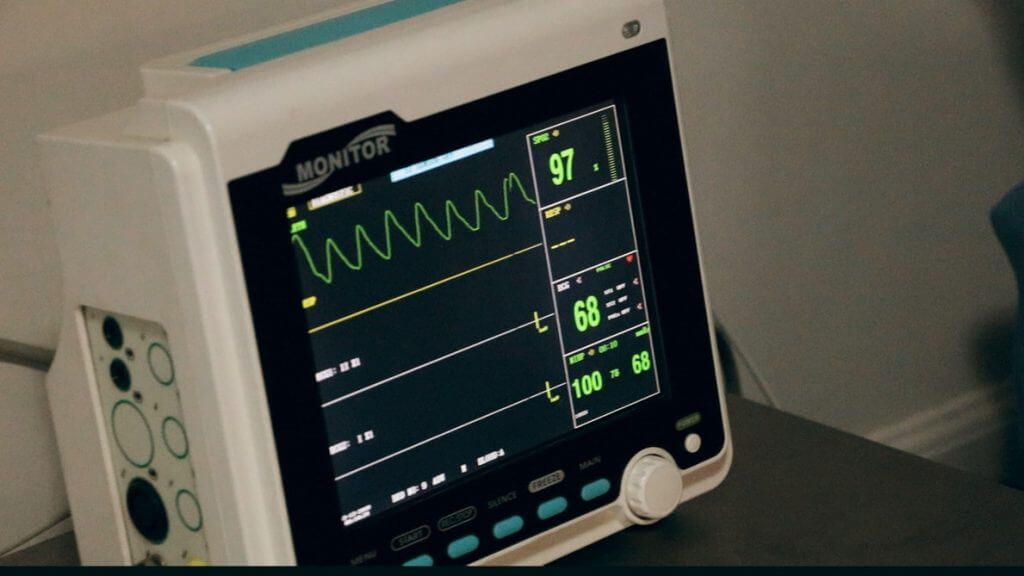
That worked for me when I was having my mind racing and it was like [4:00]AM. I know I was really sick. I knew I needed to quiet my mind down so I did a mindfulness meditation. It really worked.
Yeah, it’s amazing.
Yeah. In fact, that was the one time that I talked about another one of my episodes of Get Yourself Optimized. I described this whole process where I was able to peel away each thought, kind of like layers of an onion or strands of a rope. One at a time identified that I had multiple thoughts happening simultaneously and then quiet them individually. Listeners, if you’re interested in more discussion on that and the whole meditation side of things, check out the [00:54:37] episode. It’s a fantastic episode. What sort of mindfulness or breathing types exercises do you recommend or do you think work most effectively for quieting the mind if you’re racing?
My favorite thing is deep abdominal breathing. There’s a lot of methodologies out there. Something that I’ve found works particularly well is the 467 method. Breathing in for a count of four, holding it for a count of six, and then exhaling for a count of seven. This really helps you get all of the air out of your lungs and you really have to focus because you’re counting in your head as you’re inhaling, holding, and exhaling quite frankly you can’t think of much else. That can be very helpful. Again, deep abdominal breathing can be helpful. I also like the technique called progressive muscle relaxation. This is where you tense up from your toes muscle groups one at a time and then relax tense and relax and you work your way up your body. You’ll be surprised to find out that most people will be out cold by the time they hit their head because their body is starting to become more relaxed, their heart rate is starting to slow down and they can enter into sleep a lot easier.
Cool. I understand that you met Hal Elrod recently and I just had him on my podcast. What a great guy and what an incredible story. What happened to him and how he rose above his circumstances to create an incredible life for himself. Now he’s got this great book Miracle Morning. It seems like somebody who’s a wolf probably or at least a bear with wolf tendencies, I’m not really loving the idea of being a big morning person, getting up an hour earlier, and doing all this morning ritual and everything. I do have a morning ritual but I do it late in the morning and he’s all about getting up super early. I’d love to apply some of what he teaches. I have some internal resistance around that. The first question, should I try to become more of a morning person and apply some of his techniques, or do I just do the, I’m the wolf chronotype, and here’s the stuff that I’m going to do from your book it’s a…
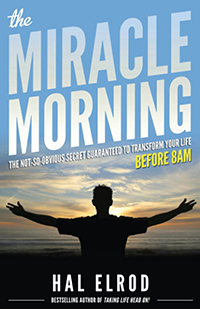
Sure. Here’s what I’ll tell you because I know Hal and I’m actually in the movie The Miracle Morning. They are actually filming a movie right now about it. He asked me to come on because I was the position to a lot of what he as saying. Especially somebody like you who is we think a bear, maybe a wolf in bear clothing as they say. You should not. All the techniques that he offers are wonderful and you can do them, just do them later. The reason that he chooses the early AM times is because historically many of the successful people that he spoke to do that but we also know that that type of successful person in many cases is a lion. That’s part of the reason for their success. You can’t fool mother nature. If you are a wolf, you’re a wolf. I love Hal and I love all the things that he’s doing and I think The Miracle Morning can actually work for any chronotype at the right time. Don’t get bogged down by the idea that you have to wake up at [4:30], [5:00] and start doing all the things that he is suggesting doing. Get up at the right time for your chronotype and then from there do those things and you can still have a miracle morning, it just might be a little bit later.
Okay, cool. How does somebody work with you if they’re interested in improving their sleep? I know you have clients but is it just primarily people who have sleep disorders or will you work with a busy executive who wants to take their life and health to whole new level.
All of the above, my friend. First of all, I would ask everybody out there if you get the opportunity, take the quiz. Go to thepowerofwhenquiz.com or thepowerofwhen.com, either one. Take the quiz and figure out what you are. My email is on there for people that are interested in getting an appointment to learn more. I do treat sleep disorders. I live in California. I’m licensed in California so if you live in California that certainly makes it much easier. I have been known to do tele-consults but places where I’m licensed if we’re going to be doing full-on cognitive behavioral therapy and things like that but I do make recommendations and the book itself gives some fantastic recommendations. We have a whole section on sleep. When to go to sleep, when to wake up, when to nap, if you should nap, things like that.
I highly recommend that as well and I am starting to work with more and more executives. It’s really interesting is because I’m now even starting to get executive who says, I want my whole company to take the quiz and we want to start planning our creative meetings when our wolves are actually awake. No longer are we doing creative meetings at [9:00] AM, we’re doing our creative meetings at [4:30] AM. It actually works out much better because that’s when my creative team is actually awake enough to have a creative thought. I’m actually finding that it’s working very, very well in business situations. People are already asking me when am I going to come out with the next book The Power of When for Business because it’s really quite fascinating to see what people are doing.
This could be a really profound thing to implement in your business. Understanding the when of your staff and accommodating their chronotypes for the meetings and breaks and all that sort of stuff.
Exactly.
Very cool. Alright.
It’s a lot of fun stuff.
Thank you, Michael, it was great having you. Listeners, I really encourage you to go to Get Yourself Optimized website. If you don’t get enough or you don’t get the right kind of quality of sleep, it can shorten your lifespan. There’s nothing more important, maybe the quality, the air that you breath are more important but other than that sleep is right up or near the top of the list. Get the checklist. Start applying some of the stuff. Get Dr. Breus’s book, The Power of When and apply it in your life. Thank you and we’ll catch you on the next episode of Get Yourself Optimized. This is your host, Stephan Spencer, signing off.
Important Links
Connect with Dr. Michael Breus
Tools/Apps

